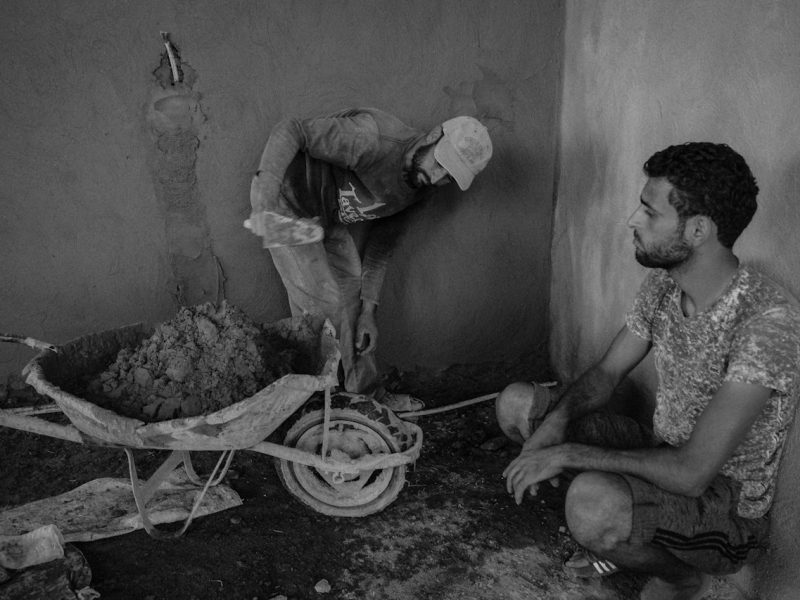Today the word of God speaks to us of salvation and liberation.
Salvation. During his journey from Beersheba to Haran, Jacob decides to stop and
rest in a solitary place. In a dream, he sees a ladder: its base rests on the earth and
its top reaches to heaven (cf. Gen 28:10-22). The ladder, on which angels of God are
ascending and descending, represents the connection between the divine and the
human, fulfilled historically in Christ’s incarnation (cf. Jn 1:51), which was the
Father’s loving gift of revelation and salvation. The ladder is an allegory of the divine
action that precedes all human activity. It is the antithesis of the Tower of Babel,
built by men with their own strength, who wanted to reach heaven to become gods.
In this case, however, it is God who comes down; it is the Lord who reveals himself;
it is God who saves. And Emmanuel, God-with-us, fulfils the promise of mutual
belonging between the Lord and humanity, in the sign of an incarnate and merciful
love that gives life in abundance.
Faced with this revelation, Jacob makes an act of trust in the Lord, which becomes a
work of recognition and adoration that marks a key moment in the history of
salvation. He asks the Lord to protect him on the difficult journey he must make, and
says: “The Lord shall be my God” (Gen 28:21).
Echoing the words of the patriarch, we repeated in the psalm: “O my God, I trust in
you”. He is our refuge and our strength, our shield and our armour, our anchor in
times of trial. The Lord is a refuge for the faithful who call on him in times of
tribulation. For it is indeed at such moments that our prayer is made purer, when we
realize that the security the world offers has little worth, and only God remains. God
alone opens up heaven for those who live on earth. Only God saves.
This total and absolute trust is shared by the head of the synagogue and the sick
woman in the Gospel (cf. Mt 9:18-26). These are scenes of liberation. Both draw
close to Jesus in order to obtain from him what no one else can give them: liberation
from sickness and from death. On the one hand, there is the daughter of one of the
city authorities; on the other, a woman afflicted by a sickness that has made her an
outcast, marginalized, someone impure. But Jesus makes no distinctions: liberation
is generously given to each of them. Their longing places both the woman and the
girl among the “least” who are to be loved and raised up.
Jesus reveals to his disciples the need for a preferential option for the least, those
who must be given the front row in the exercise of charity. There are many forms of
poverty today; as Saint John Paul II wrote: “The ‘poor’, in varied states of affliction,
are the oppressed, those on the margin of society, the elderly, the sick, the young,
any and all who are considered and treated as ‘the least’” (Apostolic Exhortation Vita
Consecrata, 82).
On this sixth anniversary of the visit to Lampedusa, my thoughts go out to those
“least ones” who daily cry out to the Lord, asking to be freed from the evils that afflict
them. These least ones are abandoned and cheated into dying in the desert; these
least ones are tortured, abused and violated in detention camps; these least ones
face the waves of an unforgiving sea; these least ones are left in reception camps
too long for them to be called temporary. These are only some of the least ones who
Jesus asks us to love and raise up. Unfortunately the existential peripheries of our
cities are densely populated with persons who have been thrown away, marginalized,
oppressed, discriminated against, abused, exploited, abandoned, poor and suffering.
In the spirit of the Beatitudes we are called to comfort them in their affliction and
offer them mercy; to sate their hunger and thirst for justice; to let them experience
God’s caring fatherliness; to show them the way to the Kingdom of Heaven. They are
persons; these are not mere social or migrant issues! “This is not just about
migrants”, in the twofold sense that migrants are first of all human persons, and that
they are the symbol of all those rejected by today’s globalized society.
We spontaneously return to the image of Jacob’s ladder. In Christ Jesus, the
connection between earth and heaven is guaranteed and is accessible to all. Yet
climbing the steps of this ladder requires commitment, effort and grace. The weakest
and most vulnerable must to be helped. I like to think that we could be those angels
ascending and descending, taking under our wings the little ones, the lame, the sick,
those excluded: the least ones, who would otherwise stay behind and would
experience only grinding poverty on earth, without glimpsing in this life anything of
heaven’s brightness.
This is, brothers and sisters, a tremendous responsibility, from which no one is
exempt if we wish to fulfil the mission of salvation and liberation in which the Lord
himself has called us to cooperate. I know that many of you, who arrived just a few
months ago, are already assisting brothers and sisters who have come even more
recently. I want to thank you for this most beautiful example of humanity, gratitude
and solidarity.




